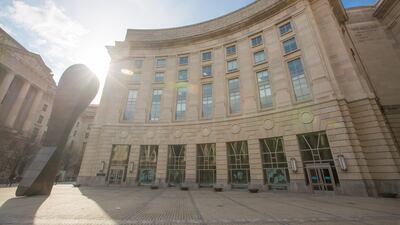The Wilson Centre has announced the 2023 recipients of Agents of Change Youth Fellowship, launched with support from the UAE embassy in Washington.
The fellowship was created in recognition of the significance of the Middle East and North Africa region when it comes to climate response and the potential for youth leadership to shape a more sustainable, peaceful and prosperous future.
“I look forward to learning from the class of 2023," said Merissa Khurma, Middle East Programme director at the Wilson Centre.
The 10 recipients of the fellowship are young people from across the Mena region who are focused on topics related to climate change and youth empowerment.
"They are all young, energetic and committed to finding solutions to the myriad climate-induced challenges in their locales," Ms Khurma said.
"This class is diverse in its experiences, expertise and regional focus so the opportunities are tremendous to learn from each other, cross-pollinate and strengthen their network in the region to prioritize climate change on national and regional agendas."
Climate change around the world - in pictures
Here are this year's recipients:
Khalil Abu Allan is a faculty member at the West Bank's Hebron University. An expert in spatial modelling techniques and groundwater sensitivity assessment in arid regions, he has focused on the role of youth in managing the environment and conserving environmental resources as well as the conservation and management of water resources.
Abdullah J Alfayadh is an international development and peacebuilding practitioner, currently serving as part of the UN Assistance Mission for Iraq. He manages programming in support of community resilience and communal peace.
Josiane Atallah works with the International Rescue Committee in Lebanon and is a Fulbright Scholar. She has been involved in programmes focused on grassroots organising, sustainable solutions and development as well as education.
Nour Barakeh completed studies at the Higher Institute of Dramatic Arts in Damascus, Syria, and graduated from the Faculty of Pharmacy at Damascus University. She has spoken at a number of events on sustainability, refugee and migration issues and has written several plays on peacekeeping and relationship-building.
Adina Halevi is involved in a number of development projects around Israel and works on the conservation of open spaces. She has also worked on several projects focused on innovative wastewater treatment and improving water access for farmers in the West Bank and Jordan.
Eslam A Hassanein is an assistant lecturer at the Faculty of Politics and Economics at Beni Suef University in Egypt and has worked as a research assistant on a variety of projects at Zayed University in Abu Dhabi. Her research interests are focused on environmental economics, climate change and economic development.
Jezia Labidi is a researcher with several years' experience in nonprofit organisations. She is a junior expert in the monitoring, evaluation and project management for development organisations and a project specialist at the US Institute of Peace, managing peacebuilding, community-security dialogue and environmental governance projects.
Hamza Saidi is a project co-ordinator for the Regional Programme on Energy Security and Climate Change, Middle East and North Africa, at the Konrad-Adenauer-Stiftung regional office in Rabat, Morocco, managing the conceptualisation and implementation of dialogue programmes and training/workshop sessions on resource security and climate change-relevant topics for the Mena region in connection to the EU.
Gokce Sencan is a climate and water policy researcher based in California. Her areas of expertise include droughts, water management and the public health impacts of climate change in Mediterranean climates. She has worked on issues including urban drought resilience, agriculture, freshwater ecosystems, water markets, groundwater management and the energy-water relationship.
Neeshad Shafi is an environmentalist and policy-oriented social change advocate, working through the youth climate movement to affect change in environmental and climate policies in the Middle East. He is co-founder and executive director of the Arab Youth Climate Movement, Qatar.
The Wilson Centre is a non-partisan US policy forum that aims to tackle global issues through independent research and open dialogue to inform actionable ideas for the policy community.



















